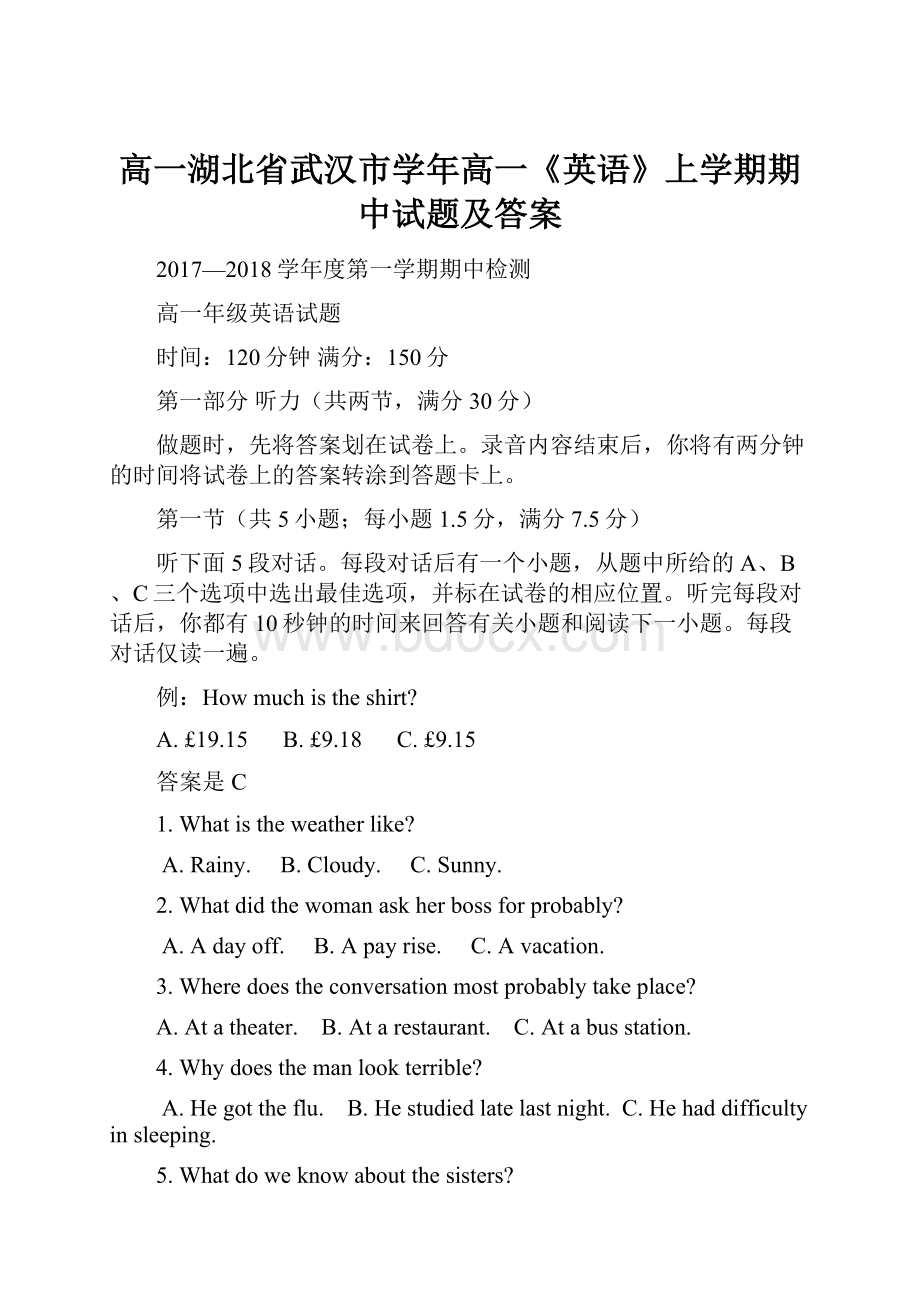高一湖北省武汉市学年高一《英语》上学期期中试题及答案Word文件下载.docx
《高一湖北省武汉市学年高一《英语》上学期期中试题及答案Word文件下载.docx》由会员分享,可在线阅读,更多相关《高一湖北省武汉市学年高一《英语》上学期期中试题及答案Word文件下载.docx(15页珍藏版)》请在冰豆网上搜索。

例:
Howmuchistheshirt?
A.£
19.15B.£
9.18C.£
9.15
答案是C
1.Whatistheweatherlike?
A.Rainy.B.Cloudy.C.Sunny.
2.Whatdidthewomanaskherbossforprobably?
A.Adayoff.B.Apayrise.C.Avacation.
3.Wheredoestheconversationmostprobablytakeplace?
A.Atatheater.B.Atarestaurant.C.Atabusstation.
4.Whydoesthemanlookterrible?
A.Hegottheflu.B.Hestudiedlatelastnight.C.Hehaddifficultyinsleeping.
5.Whatdoweknowaboutthesisters?
A.Theyaredifferentincharacter.
B.Theyhavealotincommon.
C.Theyhavebeautifulvoices.
第二节(共15小题;
每小题1.5分,满分22.5分)
听下面5段对话或独白。
每段对话或独白后有几个小题,从题中所给的A、B、C三个选项中选出最佳选项,并标在试卷的相应位置。
听每段对话或独白前,你将有时间阅读各个小题,每小题5秒钟;
听完后,各小题将给出5秒钟的作答时间。
每段对话或独白读两遍。
听第6段材料,回答第6、7题。
6.Whatdoesthemando?
A.Apilot.B.Ascientist.C.Anofficeclerk.
7.Whatarethespeakerstalkingabout?
A.Theirjobs.B.Theirdreams.C.Theirhobbies.
听第7段材料,回答第8、9题。
8.Whatcanwelearnfromtheconversation?
A.Thewomanisinarush.B.Itisgoingtorainsoon.C.Thetrafficisheavythen.
9.Whereisthewomangoing?
A.Herhouse.B.Theoffice.C.West22ndStreet.
听第8段材料,回答第10至12题。
10.Whattypeofmoviesdoesthewomanlikethemost?
A.Detectivestories.B.Sciencefiction.C.Romanticcomedies.
11.Whatisthefunofdetectivemoviessaidbythewoman?
A.Theexcitingplot.
B.Theeye-catchingscenes.
C.Thecompetitionwiththe“detective”.
12.Whatdoesthewomanthinkaboutsciencefictionmovie?
A.Shedoesn’tlikeit.B.It’sscarysometimes.C.It’sfunny.
听第9段材料,回答第13至16题。
13.Whyisthemanupset?
A.Hedidn’tgetthepromotion.B.Hewasscoldedbytheboss.C.Hejustlostabusinessdeal.
14.Whatdoesthewomansuggestthemando?
A.Talkwiththeboss.B.Quithisjob.C.Letgoofit.
15.Whatdoweknowabouttheman?
A.Hegota200,000-dollar-deallastmonth.
B.Hedoesn’tworkhardenough.
C.Heistooshyandnervous.
16.Whatwillthewomandonextweek?
A.Throwaparty.B.Askforapayrise.C.Workinanewcompany.
听第10段材料,回答第17至20题。
17.Whatweretheearliestformoftheblues?
A.Warsongs.B.Worksongs.C.Holidaysongs.
18.Whatdoesthenamebluescomefrom?
A.HappinessandHarvest.B.Angerandsadness.C.Lonelinessandsorrow.
19.WhatcanweknowaboutBessieSmith?
A.Shehadmade150recordsinherlife.
B.Shedidn’tliketogiveliveperformances.
C.Shediedatage43.
20.WhatcausedBessie’sdeath?
A.Acaraccident.B.Gunshot.C.Illness.
第二部分阅读理解(共两节,满分40分)
第一节(共15小题;
每小题2分,满分30分)
阅读下列短文,从每题所给的四个选项(A、B、C和D)中,选出最佳选项,并在答题卡上将该项涂黑。
A
Topattractions
Amsterdamismostfamousforitsartisticheritage.ThistraditionisproudlyondisplayintheRijksmuseum(translatesasStateMuseum).Onceyou'
vetakeninallthathastooffer,artists,historyfuns,andfamiliesshouldn'
tpassupthechancetovisittheVanGoghMuseum–containingaround700paintingsanddrawingsbyVincentandhiscontemporaries,includingGauguin,Monet,andToulouse-Lautrec.
AmsterdamisalsohometotheAnneFrankMuseum,whereAnnehidwithherfamilyduringtheNazi
occupationofTheNetherlands.Onalighternote,takingacanalcruisethroughitsextensivewaterwaysisarewardingwaytoseetheDutchcapital.
Artloversgettheirkicksat:
•TheVanGoghMuseum;
•Rijksmuseum;
•MuseumhetRembrandthuis.
Foodanddrink
CheeseloversloveAmsterdam.Youcanfindanexcusetoeatcheeseatanytimeofthedayhere.GoudaisHolland'
sfavorite,developingamoreintenseflavorthelongerit'
saged.Findaselectionatthemarkets,tryacheeseboardatdinnertime,orjustordercubeswithmustardfordippingtoaccompanyadrink.
Whenyou'
rehungryfornon-cheesefoodgroups,you'
llfindMichelin-starredrestaurants,vegetarian,andorganicrestaurantsthataccompanyanarrayofglobalcuisine.Forold-fashionedandmodernDutchfood,trytheseAmsterdamrestaurants:
Moeders,HaesjeClaes,Loetje,Greetje,andDeSilverenSpiegel.
Don’tleavewithouttasting:
•Patat(hotchipswithtoppings);
•Stroopwafel(wafflecookie);
•Chocomel(chocolatemilk).
AmsterdamFastFacts
Approximateflighttimes
•NYC/Newark7hours,20minutes
•Philadelphia8hours
•Boston7hours
•Miami9hours,45minutes
•LosAngeles10hours,15minutes
Entryrequirements
Passportmustbevalidforatleast3monthsbeyondyourplanneddeparturefromtheSchengenareaandhave2blankpagesforentrystamp.
21.WherecanvisitorsseeMonet’spaintings?
A.Rijksmuseum.B.TheVanGoghMuseum.
C.MuseumhetRembrandthuis.D.TheAnneFrankMuseum.
22.Whatisthebestchoiceforacheeselover?
A.Patat.B.Stroopwafel.C.Chocomel.D.Gouda.
23.Whoisthistourguidewrittenfor?
A.Germans.B.Dutchmen.C.Americans.D.Frenchmen.
B
It'
snevereasytoexplainexactlywhenaspecificlanguagebegan,butinthecaseofEnglishwecanatleastsaythatthereislittlesenseinspeakingoftheEnglishasaseparatelanguagebeforetheAnglo-SaxonscametoBritain.Littleisknownofthisperiodwithanycertainty,butwedoknowthatGermanicinvaderscameandsettledinBritainfromthenorth-westerncoastlineofcontinentalEuropeinthefifthandsixthcenturies.TheinvadersallspokealanguagethatwasGermanic(relatedtoDutch,Frisian,GermanandtheScandinavianlanguages,andtoGothic),butwe'
llprobablyneverknowhowdifferenttheirspeechwasfromthatoftheircontinentalneighbours.
ThereasonthatweknowsolittleaboutthelanguageinthisperiodisbecausewedonothavemuchinthewayofwrittenrecordsfromanyoftheGermaniclanguagesofnorth-westernEuropeuntilseveralcenturieslater.WhenOldEnglishwritingsbegantoappearintheseventh,eighth,andninthcenturiestherewasagooddealofregionalvariation(变化),butnotmorethanthatfoundinlaterperiods.ThiswasthelanguagethatAlfredtheGreatreferredtoas‘English’intheninthcentury.
TheCeltswerealreadyresident(定居)inBritainwhentheAnglo-Saxonsarrived,buttherearefewobvioustracesoftheirlanguageinEnglishtoday.SomescholarshavesuggestedthattheCeltictonguemighthavehadanunderlyinginfluenceonthegrammaticaldevelopmentofEnglish,particularlyinsomepartsofthecountry,butthisishighlyspeculative(猜测).ThenumberofborrowedwordsknownforcertaintohaveenteredOldEnglishfromthissourceisverysmall.ThosethatsurviveinmodernEnglishinclude“brock”(badger),and“comb”(atypeofvalley),alongsidemanyplacenames.
24.WhendidtheEnglishlanguagebegin?
A.AftertheAnglo-SaxonscametoBritain.
B.BeforetheGermanicinvaderssettledinBritain.
C.Atatimethatnoonewillknowforcertain.
D.AtthesametimeasGermaniclanguagesbegan.
25.“continentalneighbours”inParagraph1refertopeoplelivingin_____.
A.GreatBritainB.AfricaC.EuropeD.Ireland
26.WhydopeopleknowsolittleaboutthelanguageinBritainintheAnglo-Saxonperiod?
A.TherearenowrittenrecordsfromtheGermaniclanguages.
B.OldEnglishdidn’thaveanywrittensystem.
C.Muchofthewrittenrecordshavebeenlost.
D.Therewasagooddealofvariationintherecords.
27.WhatdoestheauthorthinkabouttheCelticlanguage?
A.ItinfluencedthegrammaticaldevelopmentofEnglish.
B.IthadlittleinfluenceonmodernEnglish.
C.ItborrowedafewwordsfromOldEnglish.
D.ItgreatlyenrichedmodernEnglishvocabulary.
C
TheMekongRiver,forthousandsofyears,hasbeenthelifelineofthepopulationsthatdependonitforsurvival.Theearliestsettlementsalongtheriverdatebackto2100BCwiththefirstrecordedcivilization—theKhmercultureofFunan.Inthe5thcentury,theKhmercultureChenlaexistedalongtheMekong,andtheKhmerempireofAngkorwasthelastgreatstateintheregion.Roughly700yearsago,theThaipeopleescapedfromSouthChinaacrosstheMekongtoformthekingdomofSiam(nowThailand),andtheMekongprotectedSiamfrominvasions.
In1540,thePortugueseAntoniodeFariawasthefirstEuropeantodiscovertheMekong.AlthoughEuropeansshowedonlysomeinterestintheMekong,theSpanishandPortuguesedidmaketradeexpeditions(探险)tothearea,andtheDutchledanexpeditionuptheMekongin1641-42.Inthemid-19thcentury,theFrenchledanexplorationontheriverbetween1866to1868anddiscoveredthattheMekonghadtoomanyrapidsandwaterfallstoeverbeusefulfornavigation(航行).From1893,theFrenchenlargedtheircontroloftheriverintoLaosuntiltheFirstandSecondIndochinaWarsendedFrenchinvolvement(介入)intheregion.
TheMekonghaslongbeenregardedasthefoundationofSoutheastAsia'
seconomicgrowthandprosperity—necessitating(使必要)cooperationbetweenthecountries.In1995,the"
AgreementontheCooperationfortheSustainableDevelopmentoftheMekongRiverBasin"
signedbythegovernmentsofCambodia,Laos,Thailand,andVietnamformedtheMekongRiverCommission(MRC).TheMRCfacilitates(促进)jointmanagementofthesharedwaterresourcesandcooperationondevelopmentissues.In1996,ChinaandBurmabecameDialoguePartnersoftheMRC.
Today,muchoftheMekongremainsundevelopedandevenunexplored.Itiscloselytiedtothedailylivesandcultureofover60millionpeople,manyofwhomliveinpoverty(贫困).However,lifealongtheriverischanging,aslargedamsontheriverhavebeenbuiltwithplansf